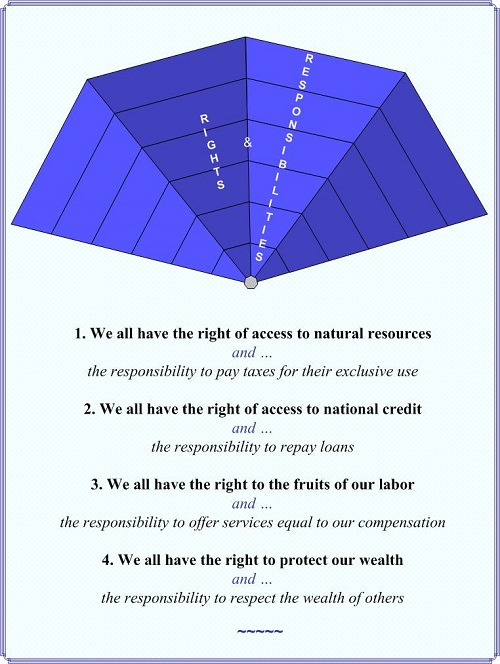I could not let this day dedicated to the remembrance of Martin Luther King go by without bringing forward what, Congress willing, the Federal Reserve System (the Fed) will do for rebuilding downtown through racial harmony
A few days before Martin Luther King was assassinated, reconnecting no doubt to President Franklin D. Roosevelt’s legacy, he issued a call for economic rights.
Access to national credit is one of the pivotal economic rights to be exercised by the people. Through the exercise of this right, citizens ask for the Fed to create money only for the creation of real wealth in the form of loans at cost to individual entrepreneurs and cooperatives or corporations with ESOPs and/or CSOPs in their operations.
Let us see what can the Fed do.
Assisted no doubt by the host of social agencies devoted to the many problems afflicting the downtown of every city, and quite a few towns, today, the Fed will fund the operations of new and old contractors who have solid plans for the renovation of the abundant, but depleted, housing stock covering acres and acres of land—and the building of new houses on those many lots filled with weeds and rubbish.
Public institutions with taxing power will, no doubt, also want to obtain loans at cost from the Fed to build or rebuild schools and the much-talked-about, depleted physical infrastructure of our country.
The minds of inhabitants of our cities and towns, young and old, male and female, will be diverted from fear of drugs and destruction of lives toward the reconstruction of their environment.
They who have willingly or unwillingly served as custodians of our physical and cultural inheritance represented by the awesome buildings of the last centuries and the civic institutions of neighborhood association and town hall meetings will have a chance to prove the validity of the old American way. The way created by Franklin and praised by Tocqueville.
Progress has not been an undivided blessing.
It is high time that we benefit from real progress in medicine and communications, to say the least, without being cowed into the acceptance of the destruction of the dignity of human souls and harmony of our physical environment.
Will young and old, male and female human beings living in our cities and towns respond to the opportunity of becoming building contractors—and all other business operations that accompany the task? The list is considerable: from interior and exterior designers, to suppliers of the many items that go into building a home, and then tools and car repair shops. Not to speak of lawyers, doctors, and accountants. Let us not forget the insurance man—or the firefighter. And why not build movie theaters and museums at the same time? In the rear guard come house painters and artists (does the name Hopper tickle the mind) and photographers and recorders of history and kibitzing.
If assisted by the schools and by the civic agencies, a few will jump to the opportunity of buying homes and renovating them. Many will gradually follow the few intrepid ones who will see the light offered by this opportunity.
But they must repay the loan. How will contractors—and associates—do that? One way is to provide rental space to friends and relatives. The other one, perhaps more satisfactory and comprehensive, is this. Assisted by the social agencies, even before asking for a loan, contractors ought to secure a buyer for the new or refurbished house.
Who are these buyers?
Well, they are readily available. They are the ones tired of living in the social isolation of the suburbs. They are the ones who preach social integration: Now they have the opportunity to practice what they preach.
More.
They are the ones who are utterly concerned about the damage caused by global warming. By avoiding long commuting lines, they will save energy: Most jobs are still in the center of cities and towns.
These good souls will no longer be part of a vociferous, scared multitude. They will be part of the solution.
They can look forward to another unexpected set of benefits. They might be able to go home to share lunch with their beloved ones. They might have more time to read, watch any performance they like, or relax. Above all their nerves will no longer be frayed by driving in noisy, smelly, dangerous traffic.
|
ABOUT THE AUTHOR
Carmine Gorga is president of The Somist Institute. He is a former Fulbright scholar and the recipient of a Council of Europe Scholarship for his dissertation on "The Political Thought of Louis D. Brandeis." Using age-old principles of logic and epistemology, as well as mathematics employed by modern engineers and scientists, in a book and a series of papers Dr. Gorga has transformed the linear world of economic theory into a relational discipline in which everything is related to everything else - internally as well as externally. He was assisted in this endeavor by many minds, notably for twenty-seven years by Professor Franco Modigliani, a Nobel laureate in economics at MIT. The resulting work, The Economic Process: An Instantaneous Non-Newtonian Picture, was published by the University Press of America in 2002 and has been republished in a paperback expanded edition in 2009. For reviews, click here. During the last few years, Dr. Gorga has concentrated his attention on the requirements for the unification of economic theory and policy, calling this unity Concordian economics, based on the following principles:.

|